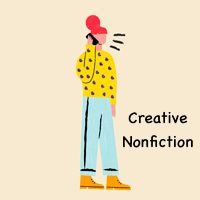The Mine was due to rise in thirty minutes, and Regge wanted to grab a bowl of ramen planetside before his shift started. He biked through the smoke and stirring bodies and boss-bots buzzing around ... [+]
There’s a photograph on my phone of my dad and me on a cruise, back in middle school. We’re sitting side-by-side at a table in one of the ship’s fancy restaurants, plates and silverware laid out elegantly before us. Our clothes are formal, but the lights are warm, granting the room an aura of cheerful sophistication. The food is sure to be excellent, the conversation stimulating although the rest of the family is somewhere out of shot. This is a place for mirth. Fitting the image, my dad and I are smiling at the camera. A beautiful scene, a happy family – in the photograph, this is all so clear. In my memory, however, that vacation and that night are hazy, just like all my memories of my dad since his death. They’re indistinct, foggy, as if floating in cold mist or trapped beneath thick ice. Reaching for them freezes my fingers to the bone, and the chill lingers for days.
The memories may be blurry, but the big picture, the full puzzle showing who my dad was, is even more obscured. It got dropped on the floor when he died, pieces flying under the table and falling behind couch cushions. I was seventeen, too old and too young for my memory to fail me like it did, like it still does. The pieces turn up slowly, but without an image on a box, I can’t make any sense of them. All I’m left with are snapshots: we’re out to dinner, on a boat, watching TV, celebrating a birthday. Arguing tensely about my sister refusing to visit him. Sitting in awkward silence, unable to have a natural conversation. Carefully ignoring the fact his breath stinks of alcohol and cigarette smoke.
That night on the cruise, I resisted taking the picture. I remember that much, but the story behind it is caught in the fog. I might’ve been acting contrary, embarrassed by the idea of a family photo. Maybe I didn’t want to pose for a happy photo with someone who made me feel anything but. Neither of those explanations feels quite right, but I can’t remember the truth. The memory’s meaning is lost. Still, I’ve been collecting these jumbled pieces in the years since his death. I’ve laid them out, cataloguing them in my mind and on paper. My task now is to reconstruct the puzzle. First I arrange them one way: he was a good father. Then another: he was a drunken narcissist. Then another: he wanted to be a good father, but failed.
None of these puzzles is a clear winner. I rearrange the pieces again and again, testing them against my memories and my feelings. This procedure is a little counterproductive: every time a puzzle is tested, it recolors the memories. Dark puzzles make for dark pieces. Memories are funny like that – the mere act of recall alters them irrevocably. It’s ironic that the more I seek the truth, the more unreachable it becomes. When I look at the cruise photo, what I see changes based on which puzzle is currently in favor. Relaxed postures. Tension in our shoulders. Strained smiles. Real grins. Of course, there are more obstacles to contend with than my own mind, for in an effort to gain objectivity, I sought outside perspectives. Another irony is incoming.
“He was the sweetest baby boy, always running around with a smile on his face,” his older sister Elizabeth said.
“There was nothing behind his eyes. Just darkness,” my mother confessed.
“He didn’t care about us, just himself,” my sister Katie ranted.
“You were the most important thing in the world to him,” my stepmother Lisa assured me.
If you squint, you can see a few discrepancies here. My hopeful pursuit of truth only left me with more puzzle pieces: other people’s amplified memories of him. Death tends to make emotions run high. The deceased person being a mentally ill alcoholic makes them run even higher. No one knows what the real puzzle looks like, apparently.
I waver between their stories, and each one in turn casts my memories in a different light. Did my father enjoy having my sister and me on that cruise, or were we irrelevant to him? In the photo, I see love behind his eyes, then darkness. Ever since that darkness became literal, I’ve kept combing through my memories, peering through the haze, assembling the pieces this way and that. I haven’t gotten anywhere. The past is still as nebulous as before, still as freezing and hostile. But I can’t leave it alone. I revisit the memories over and over again, like picking at a scab, and the wound can’t heal.
Perhaps my effort to reconstruct the past is just a flimsy excuse for what I’m really doing, which is trying to understand things that can’t be understood: why he ignored us, why he left, why he drank, why he killed himself. I’m sure that once I have all the facts, it will finally make sense. But there’s no way to make sense of the scars that parents leave.
Maybe it’s time I stop searching for meaning in half-remembered scenes. After all, the point of memory isn’t to offer up some essential truth. The point is to hold all the confusion, uncertainty, love, and pain in a way that lets us move forward. To cradle all the pieces, the beautiful and the ugly, for their own sake, not for some comforting but false picture they could form. Ultimately, it doesn’t matter what kind of father or man he was. If I can make peace with the past, that’s enough.
Some puzzles are better left alone.



